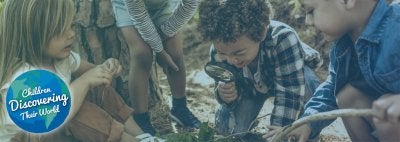

Center for Early Childhood Education and Intervention (CECEI)
Dr. Rebecca Silverman, Literacy Expert for CDW

Dr. Rebecca Silverman of Stanford University serves as a literacy expert for Children Discovering Their World.
How long have you worked on the Children Discovering Their World (CDW) project?
I have been working on CDW since work on this project began at CECEI in 2015.
What kind of related work do you do outside of CDW?
I am an Associate Professor of Early Literacy at Stanford University. I focus on research related to language and literacy development and instruction with children in preschool and elementary school. I teach in the Stanford Teacher Education Program as well. Prior to coming to Stanford, I was an Associate Professor at the University of Maryland. I have conducted federally funded research and written numerous articles on research and practice and have been published in such journals as Reading Research Quarterly, Scientific Studies of Reading, and the Journal of Educational Psychology. I am also the Editor in Chief of the Elementary School Journal, serve on the board for the International Literacy Association, and advise for the Corporation for Public Broadcasting and Public Broadcasting Service Ready to Learn Initiative.
What are your particular research interests?
I am interested in the connection between language and literacy and how language provides the foundation for so many literacy skills including phonological awareness, vocabulary, and comprehension. I am also interested in identifying best practices for supporting children’s language and literacy development.
What are your major contributions to the curricula?
I worked with the CDW team to develop the literacy scope and sequence, as well as the structure of the curricula to ensure it was well-grounded in the research on children’s language and literacy development and effective instructional practices to support that development. For example, we included explicit phonological awareness and early phonics instruction as well as robust support for oral language and early comprehension development in the curriculum. Research suggests that attending to both code-related and meaning-related skills early is important for future success in literacy.
How do you believe CDW literary experiences are unique relative to other ECE curricula/programs?
I think the integration of the language and literacy focus within the project-based approach is a major contribution of the curricula. Often language and literacy are treated as separate from other skills. Language and literacy are so connected to other areas including content area learning and social-emotional development that it makes sense to have a curriculum that brings all of them together. It creates coherence for teachers and children.
What does implementation of Read Aloud and Whole Group Literacy look like under CDW and why is this approach important?
The read alouds are intended to provide children with rich background knowledge on the topics in the curriculum. Teachers are provided with suggestions for words and concepts they may want to highlight and questions they may want to ask to support children’s comprehension and engage them in conversation about the topics in the curriculum. The whole group literacy lessons are meant to focus on particular aspects of literacy such as phonological awareness and letter knowledge through playful active learning experiences. We tried to connect whole group literacy to other aspects of the curriculum and provide suggestions for how teachers can reinforce the foundational literacy skills introduced in other parts of the day so that the focus on early literacy skills is part of the fabric of the curriculum.
From a research perspective, how do these implemented methods benefit children’s literacy development?
Language and literacy are critical aspects of children’s development. In developing the curricula, language and literacy were always at the forefront of the projects we were planning so that we could be sure that the various aspects of language and literacy were addressed systematically and in depth. The careful attention to language and literacy throughout the curricula aligns with research on how to provide children with a strong foundation for later success in reading and writing in school and beyond.
What is a highlight of your contributions to the CDW Curricula?
The best part of the process of working on the curricula was translating the research into practice. I typically write articles on research related to early literacy, but this can feel disconnected from everyday practice. Applying what I know from research to the curriculum through engaging books, songs, and poems was very rewarding. At the beginning of the project, my own daughter was in preschool, so I tried everything out with her. It was a highlight to put the research into action.